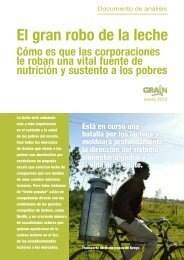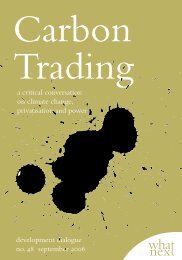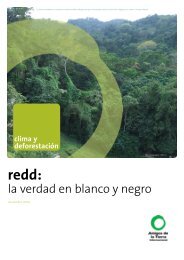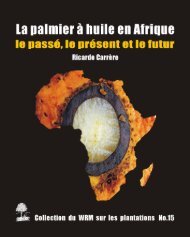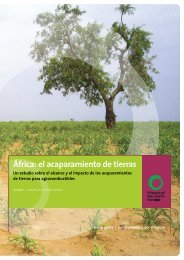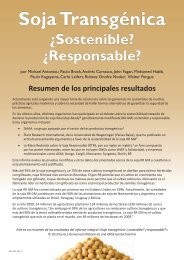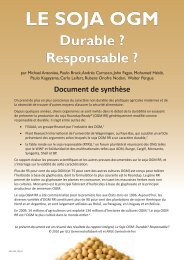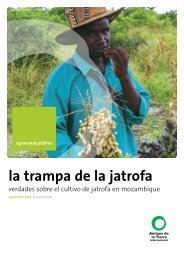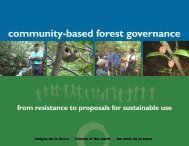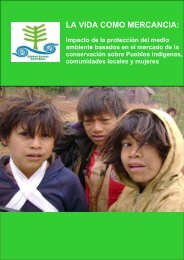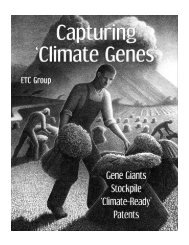Plantations, poverty and power - Critical Information Collective
Plantations, poverty and power - Critical Information Collective
Plantations, poverty and power - Critical Information Collective
Create successful ePaper yourself
Turn your PDF publications into a flip-book with our unique Google optimized e-Paper software.
43<br />
Advance Agro, Thail<strong>and</strong>: Deforestation, debt <strong>and</strong> a murky corporate structure<br />
Advance Agro is Thail<strong>and</strong>’s biggest pulp <strong>and</strong> paper company. The company has two pulp mills with a<br />
total production capacity of 580,000 tons a year <strong>and</strong> three paper plants with a total capacity of 600,000<br />
tons a year.<br />
Advance Agro was founded in 1989 by the Dumnernchanavit family. The company is part of the<br />
agribusiness Soon Hua Seng (SHS) Group, which was founded in the 1950s by members of the<br />
Dumnernchanavit family. Soon Hua Seng started growing eucalyptus on a commercial scale in the late<br />
1980s. Advance Agro was listed on the Stock Exchange of Thail<strong>and</strong> in 1995. In 2006, Advance Agro’s<br />
profit amounted to 1.97 billion Baht. 182<br />
In addition to pulp <strong>and</strong> paper, Advance Agro also generates a total of 108 MW of electricity, using wood<br />
waste <strong>and</strong> black liquor as fuel. 183 The company does not generate all its own energy <strong>and</strong> buys some<br />
electricity from a coal-fired <strong>power</strong> station. 184<br />
The company exports 60 per cent of its paper to Hong Kong, China, Australia, <strong>and</strong> Europe. 185 In 2003,<br />
Advance Agro used 50 per cent of its pulp to produce paper. Five per cent was sold in Thail<strong>and</strong> <strong>and</strong> the<br />
remainder exported to Australia, China, Korea, <strong>and</strong> Malaysia among others. 186<br />
The company claims not to have any impact on native forests in Thail<strong>and</strong>, conveniently forgetting that in<br />
1990 company employees were caught red-h<strong>and</strong>ed clearing forest to make way for eucalyptus<br />
plantations. 187 Advance Agro’s plantations have been one factor leading to the deforestation of large areas<br />
of eastern Thail<strong>and</strong>. Other factors include road building (partly built during the war in Indochina to link<br />
bases for US troops with the port at Chon Buri <strong>and</strong> also to access Cambodia’s forests), <strong>and</strong> promotion of<br />
large-scale industrial agriculture by the government with support from the World Bank. One of the<br />
beneficiaries of these policies was Soon Hua Seng, Advance Agro’s parent company. 188<br />
When Advance Agro’s subsidiary Agro Lines started establishing its eucalyptus plantations, villagers<br />
found they could no longer grow rice in neighbouring fields. The company bought villagers’ farml<strong>and</strong> in<br />
Prachinburi to convert the l<strong>and</strong> to plantations. Allegations of intimidation of villagers surrounded the<br />
182 “Advance Agro Pulbic Company Limited”, Stock Exchange of Thail<strong>and</strong>, website accessed 6 December 2007.<br />
http://www.set.or.th/set/companyinfo.dotype=profile&symbol=AA&language=en&country=US<br />
183 “Opinions of Independent Financial Advisor for the delisting of AA”, 30 November 2007.<br />
http://www.set.or.th/set/newsdetails.dofilename=dat%2Fnews%2F200712%2F07043448.e07++++++++++++++++++&h<br />
eadline=Opinions+of+IFA+for+the+delisting+of++AA&type=H&symbol=AA&time=1196925840000&language=&count<br />
ry=<br />
184 “Environmental Benefits of Double A Paper“, Access Economics, May 2007.<br />
http://www.accesseconomics.com.au/publicationsreports/showreport.phpid=125<br />
185 “Thail<strong>and</strong>’s Advance Agro rating raised to ‘B-’ after completion of debt restructuring”, Thai Press Reports, 10 June<br />
2004.<br />
186 “TRIS rating assings ‘BBB’ rating to ‘Advance Agro’ with ‘stable’ outlook”, Thai Press Reports, 20 October 2004.<br />
187 Keith Barney (2005) “At the Supply Edge: Thail<strong>and</strong>’s Forest Policies, Plantation Sector, <strong>and</strong> Commodity Export<br />
Links With China“, Forest Trends, Center for International Forestry Research, The York Center for Asian Research, pages<br />
1-2. http://www.forest-trends.org/documents/publications/Thail<strong>and</strong>%20Report%20New.pdf<br />
188 Chris Lang (2003) “Thail<strong>and</strong>: Eucalyptus, encroachment, deforestation <strong>and</strong> pollution linked to pulp <strong>and</strong><br />
paper company”, World Rainforest Movement Bulletin no 70, May 2003. http://chrislang.org/2003/05/10/thail<strong>and</strong>eucalyptus-encroachment-deforestation-<strong>and</strong>-pollution-linked-to-pulp-<strong>and</strong>-paper-company/



